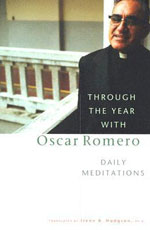Irene B. Hodgson is professor of Spanish at Xavier University in Cincinnati where she also teaches Latin American Studies. She has translated this excellent collection of excerpts from Archbishop Oscar Romero's (1917-1980) homilies and organized them as one reading per day.
Although Romero started out as a conservative Catholic priest and theologian, his faith deepened over the years and took a radical turn in response to the anguish and persecution of the people of El Salvador. The question that burned in his heart and eventually turned his life around was: "How do we speak of God in the midst of unjust suffering?" In his sermons, Archbishop Romero addressed the issues of his day including ones that are very relevant to our day: the growing gap between the rich and the poor, wealth, power, forgiveness, love, the task of the church, the quest for justice, and the necessity of nonviolence .
Here is a sampler of a few daily meditations from the book:
• Prayer
"Prayer is the peak of human development. Human beings do not have worth because of what they have, rather for what they are. And human beings really exist when they meet God face to face and understand the marvels God has done with them. God has created them intelligent beings, capable of love, free."
• The Bible and the Signs of the Times
"Besides reading the Bible, which is the word of God, a Christian who is faithful to the word must also read the signs of the times, the events, to illuminate them through the word."
• It Is Sad to Have to Leave One's Country
"It's sad to have to leave one's country because, in that country, there is not a just order where one can find work."
• The Will of God
"It is not the will of God for some to have everything and for others to have nothing. This cannot be of God. It is his will that all his children be happy."
• Preferential Option for the Poor
"It is inconceivable that someone is called 'Christian' and does not make a preferential option for the poor as Christ did. It is a scandal that today's Christians criticize the church because it is concerned with the poor."
